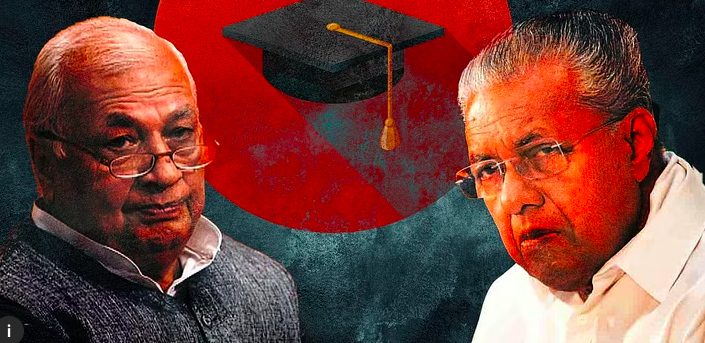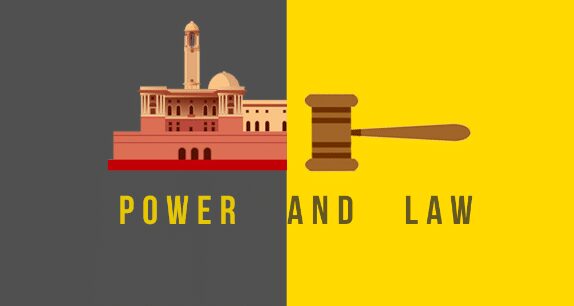Arif Mohammad Khan, the Governor of Kerala, demanded in writing that K.N. Balagopala, the state’s finance minister, must be removed from office. The chief minister, Pinarayi Vijayan, rejected the Governor’s request.

How did the dispute begin?
It happened when the finance minister of Kerala compared the higher education systems in Kerala and Uttar Pradesh, saying that people used to living and working in places like UP couldn’t understand Kerala’s democratic system and that the vice-chancellor there needed to be protected by the federal armed forces.
The Governor of Kerala responded by saying that K.N. Balagopal is using comparisons between Kerala and other states to promote regionalism and argue against the country’s unity. Additionally, Mr. Balagopal broke the oath he made before being appointed a minister. Thus, Mr. Balagopal no longer has the Governor’s backing.
The Supreme Court of India ruled that the selection process for the vice-chancellors of nine state universities did not follow the rules established by the University Grants Commission (UGC), which prompted Governor Arif Mohammad Khan to oppose the government of Kerala.
Conflict between Governors and States at various times and for various reasons:
The history of tensions between the governor and the state government dates back to the period immediately following independence, when they resulted in the dismissal of successive governments and the implementation of President Rule. There is conflict over who will form the government, if bills will be passed, how the government is run, how the chief minister is performing, and many other issues.
In 2018, the Governor of Jammu and Kashmir dissolved the Assembly under the pretext that too many parties were uniting to form a government, which would lead to instability in the system. Considering this to be precedent-setting, the Central Government divided the State into two Union Territories and regarded the Governor as the Government.
In 2018, Governor Vajubhai Vala summoned the BJP to form their government and gave them 15 days, which the Supreme Court of India eventually reduced to 3 days.
In 2019, Governor Bhagat Singh Koshiyari of the State of Maharashtra invited Devendra Fadnavis to form the government during a time of hung government. However, after they failed to demonstrate a majority, the Governor refused to call Uddhav Thackrey to do the same, even after they demonstrated a majority.
R.N. Ravi, the Governor of Tamil Nadu, made a statement in 2022 that was in opposition to the political ethos of the State Government. While the Tamil Nadu government enacted a measure to prevent the NEET from being used in the state, the governor backed the NEET exam.
The West Bengal Governor made a number of comments in 2022 that included criticism of how the Government operated and the legality of its actions.
Only Arif Mohammad Khan engaged in numerous conflicts with the Keralan government in 2022, including refusing to sign the bills amending the laws governing Kerala’s universities and the office of the lokayukta.

Governor-State Relations:
Similar to the President, the Governor serves as the de facto head of the government and is selected by the President, as opposed to the Chief Minister of State, who is chosen by the people. The Governor serves at the discretion of the President for a period of five years.
The Chief Minister and his Council of Ministers can assist the Governor in carrying out his duties under Article 163 of the Indian Constitution. Even yet, the Governor has some arbitrary powers, including the ability to reserve bills, impose President’s Rule, call a party to form the government in the event of a hung parliament, and more.
According to Article 164(1), which addresses the appointment of the Chief Minister and Council of Ministers, the Governor appoints the CM, and the Ministers might serve at the Governor’s pleasure on the CM’s proposal. Here, “pleasure” does not imply that the Governor may fire any of the Ministers at his discretion; rather, he may only do so on the Chief Minister’s recommendation.
The Governor, however, must always cooperate with the government and is not permitted to publicly oppose its policies. The governor must also constantly be impartial. Since the Constitution doesn’t outline the Governor’s authority, it presents a difficulty when he chooses sides.
Several Committees, including the Sarkaria Commission and the Administrative Reform Commission, have repeatedly submitted recommendations to the Governor on reforms. Instead of making the Governor an immediate appointment, they all suggested modifying the selection process. If the State Government is harmed, the State should have the authority to take the required actions. The Governor should be chosen by a panel. Additionally, the Governor’s term should be set at 5 years rather than being at the whim of the Indian President.
Even after all these disagreements and disputes, which diminished the status of the Governor’s office and called into question how the Government operates, nothing has been done with these proposals as of yet.












